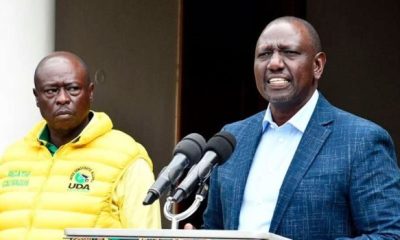Entertainment
Oga Obinna Suspends Personal Acts of Kindness Following Shalkido Death Drama
The comedian’s decision has exposed the dark side of Kenya’s online generosity culture, where helping hands are often met with suspicion, blame, and weaponized narratives.

Popular comedian and media personality Oga Obinna has pulled the plug on all personal charitable assistance, citing relentless online attacks that have turned goodwill into a weapon for clout and engagement.
The dramatic announcement, issued through Obinna TV Studios on Wednesday, comes barely 24 hours after the entertainer distanced himself from handling fundraising efforts for late Gengetone artiste Shalkido, who died following a hit-and-run accident along Thika Road.
Shalkido had been riding his motorbike home from a show in Thika, where he had performed alongside Obinna, when tragedy struck.
The accident sparked a social media firestorm, with netizens pointing fingers at Obinna simply because he was the last person seen with the artiste before the fatal crash.
When Shalkido’s family appealed for help to clear a hospital bill of 147,000 shillings, Obinna made it clear he would not be managing the funeral fundraiser, though he committed to supporting the family’s appointed representative.
“Personally, I am not going to be handling anything to do with the fundraising for the funeral. Nope. I know better. However, we will appoint someone from the family, and you guys will advise on the best way to go about it,” Obinna said in a video that sparked mixed reactions online.
The statement from Obinna TV Studios speaks to deep frustration with how acts of kindness have been twisted into ammunition for online critics. “What began as genuine efforts to uplift those in need has been met with fabricated stories, malicious trolling, and profound ingratitude that seeks to destroy rather than appreciate,” management stated.
The comedian’s decision has exposed the dark side of Kenya’s online generosity culture, where helping hands are often met with suspicion, blame, and weaponized narratives. Social media users had begun crafting wild theories about Shalkido’s death, with some suggesting Obinna bore responsibility despite the accident being a clear hit-and-run case.
Content creator 2mbili, who visited Shalkido in the ICU before his death, painted a grim picture of the artiste’s final hours, describing tubes everywhere and blood coming from his ears. He had promised to pay Shalkido’s rent this month and had even helped fuel his motorbike days before the accident.
Obinna’s management has drawn a hard line on what the entertainer will no longer do: respond to every request for assistance, submit to blackmail or public pressure, or take responsibility for life circumstances beyond his voluntary help. “He is simply an instrument, not the source of anyone’s breakthrough or success,” the statement clarified.
Despite the suspension of personal interventions, Obinna TV Studios’ corporate social responsibility programs will continue as scheduled. The Obinna TV Foundation remains the only official channel for structured charitable work, while professional business engagements remain unaffected.
In a warning shot to critics, management announced that legal action awaits anyone publishing unwarranted, unverified, or defamatory remarks. “We have tolerated baseless accusations long enough. Documentation is underway, and accountability will be pursued to the fullest extent of the law.”
The development has sparked soul-searching among Kenyans about the sustainability of public generosity. One commenter, Prince Mwiti, captured the mood: “It is coming to a point where people will stop helping each other.” Another referenced content creator Baba Talisha, who similarly stepped back from public charitable work after facing criticism.
The statement ended with a Biblical verse from Mark 9:43, suggesting a painful but necessary amputation: “If your hand causes you to stumble, cut it off. It is better for you to enter life maimed than with two hands to go into hell.”
For Obinna, who has built a reputation as one of Kenya’s most generous entertainers, the decision marks a turning point. The man who once opened his doors and wallet to struggling artistes and content creators has now closed the tap, at least on a personal level, choosing structure over spontaneity, foundation work over individual appeals.
Whether this suspension is temporary or permanent remains to be seen, but it sends a clear message: even the most generous spirit has its breaking point when gratitude gives way to grievance and kindness becomes a liability rather than a virtue.
Kenya Insights allows guest blogging, if you want to be published on Kenya’s most authoritative and accurate blog, have an expose, news TIPS, story angles, human interest stories, drop us an email on [email protected] or via Telegram
-

 Grapevine1 week ago
Grapevine1 week agoRussian Man’s Secret Sex Recordings Ignite Fury as Questions Mount Over Consent and Easy Pick-Ups in Nairobi
-

 News5 days ago
News5 days agoTHE FIRM IN THE DOCK: How Kaplan and Stratton Became the Most Scrutinised Law Firm in Kenya
-

 Investigations1 week ago
Investigations1 week agoMulti-Million Dollar Fraud: Three Kenyans Face US Extradition in Massive Cybercrime Conspiracy
-

 Economy6 days ago
Economy6 days agoIran Demands Arrest, Prosecution Of Kenya’s Cup of Joe Director Director Over Sh2.6 Billion Tea Fraud
-

 Business7 days ago
Business7 days agoA Farm in Kenya’s Rift Valley Ignites a National Reckoning With Israeli Investment
-

 Africa1 week ago
Africa1 week agoFBI Investigates Congresswoman Ilhan Omar’s Husband’s Sh3.8 Billion Businesses in Kenya, Somalia and Dubai
-

 Business2 weeks ago
Business2 weeks agoM-Gas Pursues Carbon Credit Billions as Koko Networks Wreckage Exposes Market’s Dark Underbelly
-

 Arts & Culture1 week ago
Arts & Culture1 week agoWhen Lent and Ramadan Meet: Christians and Muslims Start Their Fasting Season Together






















